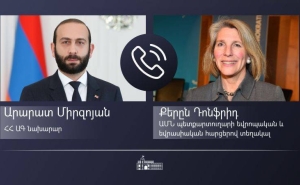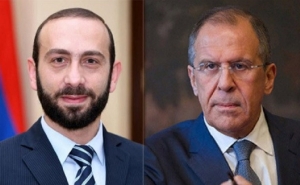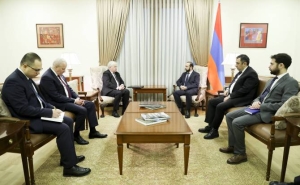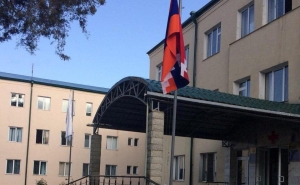 US-Russian Competition in South Caucasus is Getting Much Stronger
US-Russian Competition in South Caucasus is Getting Much Stronger
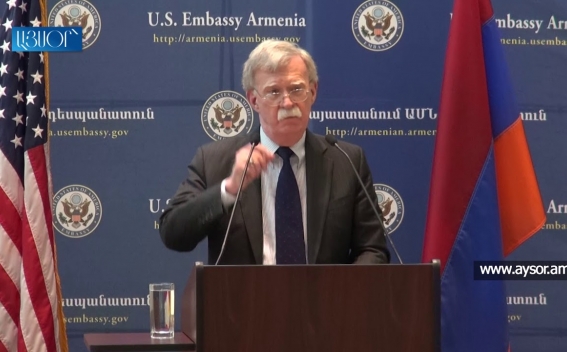
One of the most discussed topics in the region since last week has been the visit of the US President's Security Advisor John Bolton to Russian and South Caucasian three capitals. Everyone was trying to figure out what the White House's representative had come for and what signals thus were sent to the leaders of these several countries.
Let's note that this was quite a unique visit. The last time the US President's Security Advisor visited Armenia in 1997 and was the first time in Azerbaijan.
If we try to define the purpose of the visit in one paragraph, it was a test of the strength of the US position in the region and the desire to increase the US influence in order not to allow Russia's "monopoly" in South Caucasus. It can be said that the Trump administration has paid little attention to the South Caucasus in its foreign policy, even though the former US Co-Chair of the OSCE Minsk Group James Warlick recently stated that he does not see the interest of the White House on the Artsakh issue and would like to see Washington become more active.
Now Bolton's visit and interest in the region is conditioned by the growing importance of Yerevan, Baku and Tbilisi for the United States as "strategic importance of the region," as US Presidential Advisor said during his press conference. And that, in turn, is explained by US interest to provide Iran's neighboring countries engagement in US sanctions against Iran, as well as with desire to prevent the absolute influence of Russia in this region.
Strangely enough, however, Bolton's announcement stems from the fact that the US is ready to compete with Russia even in the issue of arms sales to the Karabakh conflict parties. Trump's advisor announced in Yerevan that arms sales by the Russian Federation do not promote peace in the region, but at the same time keep control over the parties, so Washington is ready to compete with Russia in this regard, especially given the fact that "American weapons are more qualified than Russian ones". It turns out that Washington, as a mediator in the settlement of the Artsakh conflict, a co-chair of the OSCE Minsk Group, is not trying to put pressure on Moscow, preventing arms sales to conflict parties, but instead is ready to compete with the latter to increase the leverage on Armenia and Azerbaijan and to supply more powerful weapons to destroy the people of the region.
John Bolton has made some remarkable statements about the Artsakh conflict. In particular, he noted that the settlement of the conflict is the best way for Armenia to get rid of external influences, meaning Russia, naturally. Moreover, he tried to show the Armenian Prime Minister the "right way", noting that by getting the mandate of the overwhelming majority of people in the upcoming elections, Nikol Pashinyan will be able to take decisive steps in the Artsakh issue. Under such steps, Bolton meant rather unpopular solutions, in the face of concessions, about which US Ambassador to Armenia Richard Mills spoke a few days ago. If we take into account Bolton's observation that he did not come to change the US policy or to make new proposals, we can assume that the issue will become relevant after the December elections and then the US can put pressure on Armenia to make concessions…
At the same time, Bolton did not talk about any concessions or decisive steps when speaking in Baku. He only thanked Aliyev for presenting his approaches and stated that the settlement of the conflict is important for the United States.
Summing up the results of James Bolton's visit we can state that it raised many issues in the region, at the same time giving a certain degree of activation of the US-Russian competition in the South Caucasus. And this is not happy news from the perspective of regional stability. At the same time, given the current US-Russian dialogue, it is logical that the US President's Adviser was trying to measure the US presence in the region and its potential in the future dialogues with Moscow.
Other materials on this subject
- Russian forces have clearly failed in their duties: senators press Biden Administration to break Azerbaijan’s blockade The United States cannot stand aside while the Aliyev regime callously threatens the lives of Nagorno-Karabakh’s citizens, and must hold Azerbaijan to account for blocking a civilian population’s access...
- US calls for the full restoration of free movement through the Lachin Corridor "We remain concerned about impeded access to the Lachin Corridor and the humanitarian implications of this situation. This sets back the peace process and undermines international confidence. We call for...
- Azerbaijani forces violate the ceasefire in Artsakh The ceasefire violation was reported to the command of the Russian peacekeeping troops.
- Azerbaijani units violate ceasefire in several directions, Artsakh’s Defense Ministry says The Armenian side has no losses. The incidents of ceasefire violations were reported to the command of the Russian peacekeeping troops.
- Russian Diplomat Reassures Armenians Over Corridor In Karabakh "The parties are in direct contact, and I assure you that the peacekeepers will not move a single centimeter until there is a new corridor," Seleznyov said.
-
 17:08
17:08The regular session of the Anti-corruption Policy Council takes place in Jermuk
-
 15:05
15:05The Prime Minister sends congratulatory messages to the supreme leader of Iran and the President of Iran
-
 11:11
11:11Armenia sends earthquake aid to Turkey
-
 10:43
10:43Commemoration of the Pontiff St. Sahak Partev
-
 09:16
09:16Some roads are closed and difficult to pass in Armenia
-
 19:55
19:55Phone conversation of the Foreign Minister of Armenia with the U.S. Assistant Secretary of State for European and Eurasian Affairs
-
 18:30
18:30Prime Minister Pashinyan and President Khachaturyan meet
-
 18:20
18:20Ararat Mirzoyan with Co-Chairman of the OSCE Minsk Group of France Brice Roquefeuil
-
 17:01
17:01Humans could land on Mars within 10 years, Musk predicts
-
 16:45
16:45France, US urge 'immediate' end to Nagorno Karabakh blockade
-
 16:01
16:01Blockaded Nagorno Karabakh launches fundraiser to support quake-hit Syria
-
 15:59
15:59Earthquake death toll in Turkey rises to 18,342
-
 15:43
15:43Ararat Mirzoyan Held a Telephone Conversation with Sergey Lavrov
-
 15:06
15:06French president rules out fighter jet supplies to Ukraine in near future
-
 14:47
14:475 Day Weather Forecast in Armenia
-
 14:44
14:44President Vahagn Khachaturyan wrote a note in the book of condolences opened in the Embassy of Syria in Armenia
-
 14:20
14:20Azerbaijan’s provocations impede establishment of peace and stability – Armenian FM tells Russian Co-Chair of OSCE MG
-
 12:57
12:57France representation to OSCE: Paris calls on Azerbaijan to restore freedom of movement through Lachin corridor
-
 11:40
11:40Command of Kosovo forces highly appreciated preparation of Armenian peacekeepers
-
 10:16
10:16The United States withdrew from sanctions against Syria for six months the provision of assistance after the earthquake
day
week
month
Humidity: %
Wind: km/h


